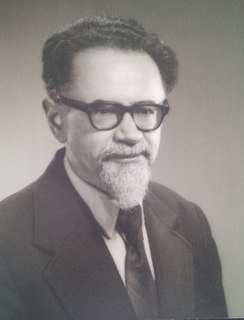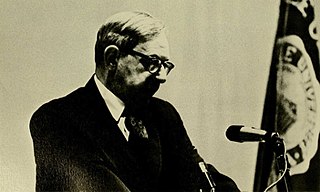Related Research Articles
Karl Joachim "Jock" Weintraub was a longtime professor of history at the University of Chicago, having taught there since 1954. He was a strong proponent of liberal education and wrote and spoke extensively on its value.
Walter Ze'ev Laqueur was a German-born American historian, journalist and political commentator. He was an influential scholar on the subjects of terrorism and political violence.

Fritz Richard Stern was a German-born American historian of German history, Jewish history and historiography. He was a University Professor and a provost at New York's Columbia University. His work focused on the complex relationships between Germans and Jews in the 19th and 20th centuries and on the rise of National Socialism in Germany during the first half of the 20th century.

Ernst Badian was an Austrian-born classical scholar who served as a professor at Harvard University from 1971 to 1998.
Henry Egon Friedlander was a German-American Jewish historian of the Holocaust who was noted for his arguments in favor of broadening the scope of casualties of the Holocaust.
Ismar Schorsch is the Chancellor emeritus of The Jewish Theological Seminary (JTS) and the Rabbi Herman Abramovitz Professor of Jewish history.

Felix Gilbert was a German-born American historian of early modern and modern Europe. Gilbert was born in Baden-Baden, Germany, to a middle-class Jewish family, and part of the Mendelssohn Bartholdy clan. In the latter half of the 1920s, Gilbert studied under Friedrich Meinecke at the University of Berlin. Gilbert's area of expertise was the Renaissance, especially the diplomatic history of the period He was a fellow of the Institute for Advanced Study in Princeton from 1962 to 1975, and maintained an active involvement as an emeritus faculty member until his death in 1991. He was elected to the American Academy of Arts and Sciences in 1963 and the American Philosophical Society in 1969.
Friedrich Katz was an Austrian-born anthropologist and historian who specialized in 19th and 20th century history of Latin America, particularly, in the Mexican Revolution.
Hans Louis Trefousse was a German-born American author and historian of the Reconstruction Era and World War II. He was a long time professor at Brooklyn College, from 1950 to 1998. He also taught as a distinguished professor of history at City University of New York.
Hans Wilhelm Gatzke (1915–1987) was a German-born historian of German foreign policy since World War I and belonged to the young emigrants from Nazi Germany who became historians in the United States. He is remembered by a named professorship in his honor at Williams College and a named dissertation prize at Yale University.
Klemens Wilhelm von Klemperer was a historian of modern Europe and professor at Smith College, Northampton, Massachusetts. He was a prominent member of the generation of young refugees and emigrants who fled Nazi Germany in the 1930s and established themselves as historians and often leading scholars in the United States. His teaching and writings focused on 20th century Germany and Central Europe, in particular the Nazi regime and the resistance to Hitler. In 1997, he was awarded the Austrian Cross of Honour for Science and Art, 1st class for his contribution and services to Austrian culture. He delivered a lecture in June 1998 at Westminster Abbey to mark the unveiling of a sculpture of Dietrich Bonhoeffer in the "Martyrs' Gallery".
Theodore Stephen Hamerow was a Polish-born American historian, focusing on modern history, especially German history of the 19th and 20th century.
Harald Reiche was a German-American classical scholar, specializing in an archaeoastronomical interpretation of Greek mythology.
Georg Gerson Iggers was an American historian of modern Europe, historiography, and European intellectual history.
Joachim Remak was a historian of Modern Europe, especially of Germany and World War I.
Ursula Schäfer Lamb was a distinguished American historian, specialized in Latin American History, who published works on the age of exploration and the history of science. She was a pioneering woman academic in Latin American history, whose interdisciplinary works on history of science and globalization antedate the boom in such studies.
Conrad Schirokauer, was a German-American historian and writer. Born on April 29, 1929 in Leipzig, he died in Cleveland, Ohio on September 19, 2018. His father, Arno Schirokauer, was a German-Jewish literary scholar and philologist.
Herbert Arthur Strauss was a German-born American historian.
Andreas W. Daum is a German-American historian who specializes in modern German and transatlantic history, as well as the history of knowledge and global exploration.
Harry Jindrich Benda was a full professor at Yale University. He specialised in Indonesian politics.
References
- ↑ Andreas Daum, "Refugees from Nazi Germany as Historians: Origins and Migrations, Interests and Identities", in The Second Generation: Émigrés from Nazi Germany as Historians. With a Biobibliographic Guide, ed. Andreas Daum, Hartmut Lehmann, James J. Sheehan. Berghahn Books, 2016, pp. 12, 22, 24, 29, 34, 36; also see in this volume pp. 403‒4.
- ↑ "Theodore H. Von Laue (1916-2000) | Perspectives on History | AHA". www.historians.org.
- ↑ Leopold Ranke: the formative years (in German)
- ↑ Sergei Witte and the Industrialization of Russia, Columbia University Press, 1963
- ↑ Why Lenin? Why Stalin? (in German), J. B. Lippincott, 1971 [1964], OCLC 285694
- ↑ Why Lenin? Why Stalin? Why Gorbachev? (in German), HarperCollins, 1993, ISBN 9780065011111
- ↑ Theodore Hermann Von Laue (1987), The World Revolution of Westernization: the Twentieth Century in Global Perspective (in German), New York: Oxford University Press, ISBN 9780195049077
- ↑ "Book Reviews, Sites, Romance, Fantasy, Fiction".
- ↑ "A World History for the Future?".